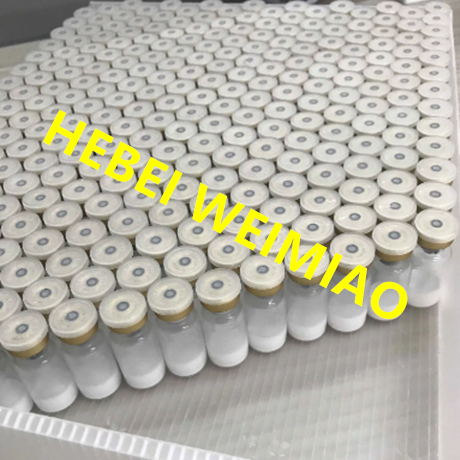
- +86-13363869198
- weimiaohb@126.com

Sep . 15, 2025 12:55 Back to list
High-Quality Semaglutide Powder - Hebei Weimiao | Diabetes Treatment, Weight Management
Introduction
Semaglutide, a groundbreaking pharmaceutical compound with the CAS number 910463-68-2, has emerged as a pivotal player in the treatment of type 2 diabetes and obesity. This article delves into the intricate details of Semaglutide, exploring its functional mechanisms, technical specifications, applications, and the company behind its production. Additionally, we incorporate insights from the National Institute of Standards and Technology (NIST) to underscore the importance of precision in pharmaceutical development.
Product Overview
Semaglutide is a synthetic peptide designed to mimic the actions of glucagon-like peptide-1 (GLP-1), a hormone critical for regulating blood sugar levels. By binding to GLP-1 receptors, it enhances insulin secretion, suppresses glucagon release, and slows gastric emptying, thereby improving glycemic control in adults with type 2 diabetes (T2DM). Furthermore, its role in weight management has garnered significant attention, as it promotes satiety and reduces caloric intake.

Technical Specifications
The following table provides a detailed overview of Semaglutide's technical parameters:
| Parameter | Details |
|---|---|
| CAS No. | 910463-68-2 |
| Product Name | Semaglutide |
| Synonyms | Sermaglutide, Semaglutide fandachem, Semaglutide impurity, Sermaglutide USP/EP/BP, etc. |
| Molecular Formula | C187H291N45O59 |
| Formula Weight | 4113.57754 |
| Appearance | White to off-white solid powder |
| Purity | >98% |
| Storage | Dry, dark, and at 0–4°C (short term) or -20°C (long term) |
| Solubility | Soluble in DMSO |
| Shipping Condition | Ambient temperature as non-hazardous chemical |
Functional Mechanism
Semaglutide's efficacy stems from its structural modifications compared to liraglutide, a similar GLP-1 receptor agonist. The inclusion of two key changes—replacement of Gly with 2-aminoisobutyric acid (Aib) at position 2 and the attachment of an 18-carbon fatty acid moiety—enhances its stability and binding affinity. These modifications increase resistance to dipeptidyl peptidase-4 (DPP-4), an enzyme that degrades GLP-1, and improve its half-life in humans to approximately seven days (NIST). This extended half-life allows for once-weekly dosing, improving patient compliance.

Applications
Semaglutide's applications span multiple therapeutic areas:
- Weight Loss: Clinical trials have demonstrated its effectiveness in reducing body weight by enhancing satiety and reducing food intake (NIST).
- Anti-Diabetic Therapy: It is FDA-approved for T2DM management, offering improved glycemic control when combined with diet and exercise.
- Alzheimer's Disease Research: Emerging studies suggest potential neuroprotective effects, though further research is needed (NIST).
Company Profile: Hebei Weimiao Import and Export Trade Co., Ltd.
Based in Hebei, China, Hebei Weimiao Import and Export Trade Co., Ltd. specializes in the production and supply of high-quality pharmaceutical intermediates. The company is renowned for its commitment to quality, adhering to stringent international standards. With a focus on innovation and customer satisfaction, Hebei Weimiao has established itself as a reliable supplier in the pharmaceutical intermediates market.
Why Choose Hebei Weimiao?
Hebei Weimiao distinguishes itself through several key advantages:
- Quality Assurance: Rigorous third-party testing ensures product purity and safety.
- Competitive Pricing: The company offers cost-effective solutions without compromising on quality.
- Flexible Ordering: Minimum order quantities (MOQs) are flexible, accommodating both small and large-scale purchases.
- Global Reach: The company ships worldwide, ensuring timely delivery through reliable logistics partners.
FAQs
Q: Are you a trading company or manufacturer?
A: We are a manufacturer.
Q: Do you provide samples?
A: Yes, samples are available for evaluation before bulk production.
Q: What payment terms do you accept?
A: Western Union, T/T, BTC, and Alibaba.
Q: What is your delivery time?
A: Delivery occurs after receipt of full payment.
Conclusion
Semaglutide represents a significant advancement in the treatment of T2DM and obesity, offering a unique combination of efficacy and convenience. Its development and commercialization by Hebei Weimiao Import and Export Trade Co., Ltd. highlight the company's dedication to innovation and quality. As research continues to uncover its potential in areas like Alzheimer's disease, Semaglutide's impact on global healthcare is poised to grow. For those seeking reliable active pharmaceutical intermediates, Hebei Weimiao stands as a trusted partner.
References
National Institute of Standards and Technology (NIST). (2025). Advancements in Pharmaceutical Standards and Research. Retrieved from https://www.nist.gov/
-
Benefits and Global Insights into Nature's Nutrition Turmeric Curcumin
NewsNov.24,2025
-
Curcumin BCM-95 – Enhanced Turmeric Extract for Superior Absorption & Health Benefits
NewsNov.23,2025
-
Discover the Health Benefits and Global Impact of Boswellia Curcumin Supplements
NewsNov.22,2025
-
BCM-95 Curcumin – Enhanced Natural Health Supplement | Weimiaobio
NewsNov.21,2025
-
Discover the Benefits of Super Bio Curcumin – Enhanced Absorption and Global Wellness
NewsNov.21,2025
-
Semaglutide Powder for Diabetes & Weight Loss - Hebei Weimiao
NewsNov.21,2025